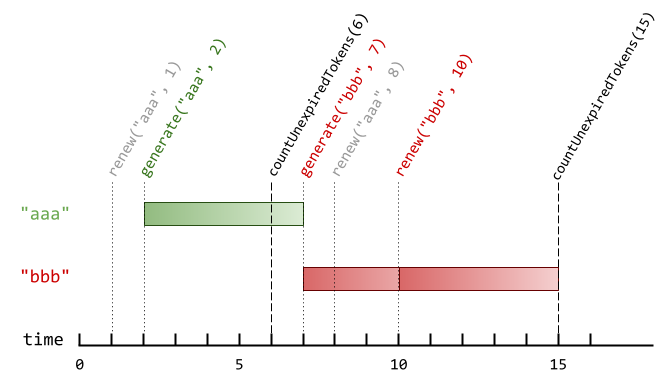Class AuthenticationManager
java.lang.Object
g1701_1800.s1797_design_authentication_manager.AuthenticationManager
1797 - Design Authentication Manager\.
Medium
There is an authentication system that works with authentication tokens. For each session, the user will receive a new authentication token that will expire `timeToLive` seconds after the `currentTime`. If the token is renewed, the expiry time will be **extended** to expire `timeToLive` seconds after the (potentially different) `currentTime`.
Implement the `AuthenticationManager` class:
* `AuthenticationManager(int timeToLive)` constructs the `AuthenticationManager` and sets the `timeToLive`.
* `generate(string tokenId, int currentTime)` generates a new token with the given `tokenId` at the given `currentTime` in seconds.
* `renew(string tokenId, int currentTime)` renews the **unexpired** token with the given `tokenId` at the given `currentTime` in seconds. If there are no unexpired tokens with the given `tokenId`, the request is ignored, and nothing happens.
* `countUnexpiredTokens(int currentTime)` returns the number of **unexpired** tokens at the given currentTime.
Note that if a token expires at time `t`, and another action happens on time `t` (`renew` or `countUnexpiredTokens`), the expiration takes place **before** the other actions.
**Example 1:**

**Input**
["AuthenticationManager", "`renew`", "generate", "`countUnexpiredTokens`", "generate", "`renew`", "`renew`", "`countUnexpiredTokens`"]
[[5], ["aaa", 1], ["aaa", 2], [6], ["bbb", 7], ["aaa", 8], ["bbb", 10], [15]]
**Output:** [null, null, null, 1, null, null, null, 0]
**Explanation:**
AuthenticationManager authenticationManager = new AuthenticationManager(5); // Constructs the AuthenticationManager with `timeToLive` = 5 seconds.
authenticationManager.`renew`("aaa", 1); // No token exists with tokenId "aaa" at time 1, so nothing happens.
authenticationManager.generate("aaa", 2); // Generates a new token with tokenId "aaa" at time 2.
authenticationManager.`countUnexpiredTokens`(6); // The token with tokenId "aaa" is the only unexpired one at time 6, so return 1.
authenticationManager.generate("bbb", 7); // Generates a new token with tokenId "bbb" at time 7.
authenticationManager.`renew`("aaa", 8); // The token with tokenId "aaa" expired at time 7, and 8 >= 7, so at time 8 the `renew` request is ignored, and nothing happens.
authenticationManager.`renew`("bbb", 10); // The token with tokenId "bbb" is unexpired at time 10, so the `renew` request is fulfilled and now the token will expire at time 15.
authenticationManager.`countUnexpiredTokens`(15); // The token with tokenId "bbb" expires at time 15, and the token with tokenId "aaa" expired at time 7, so currently no token is unexpired, so return 0.
**Constraints:**
*
1 <= timeToLive <= 108
* 1 <= currentTime <= 108
* `1 <= tokenId.length <= 5`
* `tokenId` consists only of lowercase letters.
* All calls to `generate` will contain unique values of `tokenId`.
* The values of `currentTime` across all the function calls will be **strictly increasing**.
* At most `2000` calls will be made to all functions combined.-
Constructor Summary
Constructors -
Method Summary
-
Constructor Details
-
AuthenticationManager
public AuthenticationManager(int timeToLive)
-
-
Method Details
-
generate
-
renew
-
countUnexpiredTokens
public int countUnexpiredTokens(int currentTime)
-